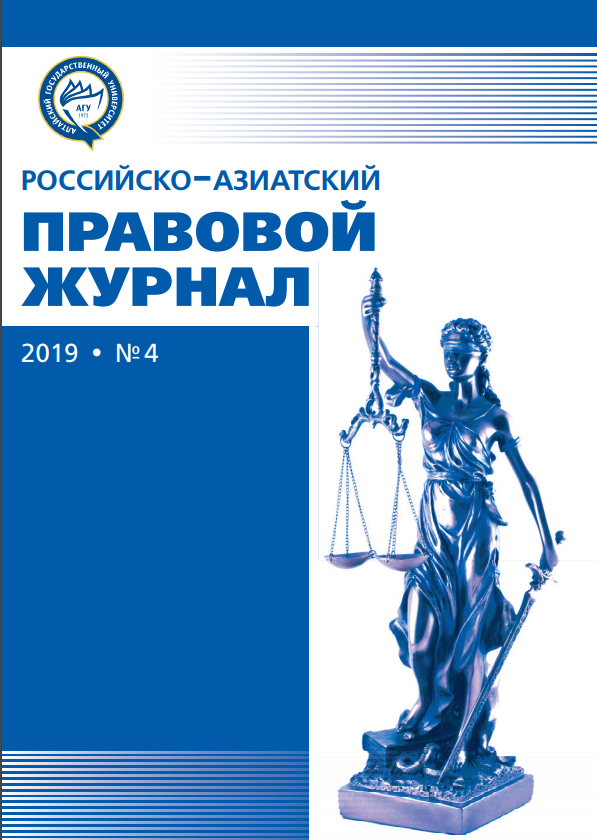A COMPARATIVE LEGAL ANALYSIS OF THE PROVISIONS CRIMINALIZING SEXUAL CRIMES IN RUSSIA AND SOME EUROPEAN COUNTRIES
УДК 34.05 ББК 67.408.1
Abstract
The article is devoted to a comparative legal study of the norms providing for criminal liability for sexualcrimes in the Russian Federation and some European countries. Some features of criminal liability for thisgroup of crimes in Spain, France, Israel, Norway, Sweden, Switzerland are investigated. It is noted that theapproach to differentiation for violent sexual crimes in different countries is different. Several qualifyingcircumstances were noted that could be borrowed to improve our legislation. These include: the commissionof the alleged assault, by a relative, relative or relative by virtue of adoption, or by any other person havingauthority over the victim; if the victim has come into contact with the perpetrator of criminal acts throughthe use of telecommunication networks; if the act is committed by several persons acting as performersor accomplices; using his official position. The rule that if two or more of the qualifying circumstances arepresent is assessed, the penalty is imposed closer to the upper limit of the sanction. It is proposed to carry out an additional analysis of the ban on disclosing the person’s name or any other data that may indicatethe person as a victim or as having lodged a complaint that he is a victim of a crime against sexual freedomor sexual integrity. Attention is also drawn to sanctions for the group of crimes under consideration. In theRussian criminal law they are more humane than in foreign countrie
Downloads
References
действиям сексуального характера в международном уголовном праве и уголовных законах зарубежных стран // Общество и право. 2010. №4 (31). С. 177–189.
2. Тыдыкова Н.В. Уголовно-правовая характеристика и вопросы квалификации насильственных
половых преступлений. М., 2013. 192 с.
3. Дьяченко А., Цымбал Е. Инцест и его уголовно-правовая оценка // Уголовное право. 2014. №4.
С. 27–32.
4. Елинский А.В. Зарубежная практика органов конституционного правосудия об уголовной ответственности за инцест: в поисках разумного баланса частных интересов и публичных ценностей //
Российский судья. 2011. №3. С. 13–18.
5. Дьяченко А.П., Цымбал Е.И. Уголовно-правовая охрана детей от сексуальных посягательств:
опыт России и зарубежных стран // Lex russica. 2014. №11. С. 1304–1315.
6. Мамулян К.В. К вопросу о понятии потерпевших в насильственных преступлениях, посягающих на половую неприкосновенность и половую свободу членов семьи // Российский следователь.
2012. №19. С. 22–24.
7. Гусарова М. В. Преступления против половой неприкосновенности несовершеннолетних
по уголовному законодательству Российской Федерации и ряда зарубежных стран // Актуальные
проблемы экономики и права. 2017. №1. С. 160–168.
8. Бимбинов А.А. Ненасильственные посягательства на половую неприкосновенность несовершеннолетних по уголовному праву зарубежных стран // Вестник Университета имени О.Е. Кутафина (МГЮА). 2015. №7 (11). С. 147–161.
9. Тыдыкова Н.В. Проблемы квалификации изнасилования, совершенного группой лиц и группой лиц по предварительному сговору // Уголовное право. 2019. №4. С. 97–102.
10. Капинус О.С., Додонов В.Н. Ответственность за изнасилование по УК стран ближнего и дальнего зарубежья // Капинус О.С. Современное уголовное право в России и за рубежом: некоторые
проблемы ответственности : сборник статей. М., 2008. С. 213–230.
Russian-Asian Law Journal is a golden publisher, as we allow self-archiving, but most importantly we are fully transparent about your rights.
Authors may present and discuss their findings ahead of publication: at scientific conferences, on preprint servers, in public databases, and in blogs, wikis, tweets, and other informal communication channels.
Russian-Asian Law Journal allows authors to deposit manuscripts (currently under review or those for intended submission) in non-commercial, pre-print servers such as ArXiv.
Authors who publish with this journal agree to the following terms:
- Authors retain copyright and grant the journal right of first publication with the work simultaneously licensed under a Creative Commons Attribution License that allows others to share the work with an acknowledgement of the work's authorship and initial publication in this journal.
- Authors are able to enter into separate, additional contractual arrangements for the non-exclusive distribution of the journal's published version of the work (e.g., post it to an institutional repository or publish it in a book), with an acknowledgement of its initial publication in this journal.
- Authors are permitted and encouraged to post their work online (e.g., in institutional repositories or on their website) prior to and during the submission process, as it can lead to productive exchanges, as well as earlier and greater citation of published work (See The Effect of Open Access).








